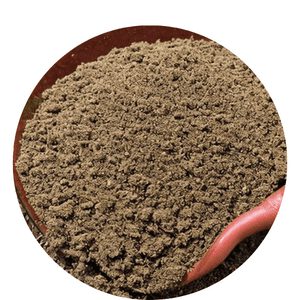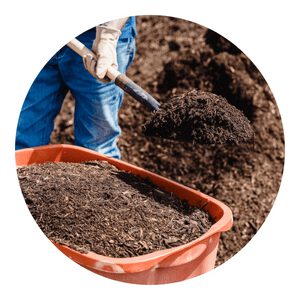Cottonseed meal organic fertilizer
Organic farming has become increasingly popular in recent years as people seek out healthier, more sustainable sources of food.
One of the key components of organic farming is the use of organic fertilizers, which can give plants all the nutrition they need without any potentially harmful chemicals.
Cottonseed meal is one such fertilizer that can provide numerous benefits to an organic garden.
It is a natural byproduct of cotton production and has proven to be an effective, inexpensive way to help plants thrive.

Table of Contents
Definition of cottonseed meal
Cottonseed meal is an organic fertilizer made from the by-products of cotton processing. It is a brown powder or cake that contains proteins, carbohydrates, and minerals that are important for plant growth.
As a slow-release fertilizer, it increases soil fertility and helps improve water retention in soils with low organic matter content.
It also provides essential nutrients to plants like nitrogen, phosphorus, and potassium which can be beneficial for vegetable gardens as well as lawns and landscapes.
The high levels of nitrogen found in cotton seed meal make it especially useful when preparing soil for planting or sowing crops as it helps to create an environment with adequate amounts of nitrogen for optimal growth.
In addition to this, cotton seed meal has been known to have antifungal properties which can help protect against certain diseases caused by fungi in plants.
Benefits of using cottonseed meal as an organic fertilizer
Organic gardeners looking for a nutrient-rich fertilizer should consider cottonseed meal.
Cottonseed meal is an organic fertilizer derived from the byproducts of the cotton industry.
Not only does it provide essential nutrients to plants, but it also helps to improve soil structure and increase microbial life in the soil.
Cottonseed meal contains nitrogen, phosphorus, and potassium as well as small amounts of other beneficial minerals such as magnesium and calcium.
This combination of macro-nutrients encourages vigorous growth in plants with lush foliage and abundant blooms.
It also helps reduce insect pest problems since its slow release of nitrogen into the soil discourages pests while not overloading the plant.
Production of Cottonseed Meal
Cottonseed meal is a by-product of cotton production that has been used for centuries as an organic fertilizer.
The process of producing cottonseed meal involves extracting the oil from the seed, then crushing and grinding the remaining seeds into a fine powder.
This powder is known as cottonseed meal. It can be further processed to create a variety of other products such as animal feed, or it can be simply left in its powdered form.
The production of cottonseed meal starts with harvesting ripe cotton bolls from plants grown under specific conditions and climates, depending on the region in which they are grown.
Once harvested, these bolls are brought to processing facilities where their seeds are separated from their fibers and hulls using various mechanical methods such as shelling machines or burr mills.
Harvesting and processing of cottonseeds
The harvesting and processing of cottonseed is an important part of the production of organic fertilizer.
Cottonseed meal is a nutrient-rich byproduct from the extraction process that can be used as an organic fertilizer, providing vital nutrients to crops.
The primary benefit of using cottonseed meal as a fertilizer lies in its high levels of nitrogen, phosphorus and potassium (N-P-K).
All three are essential components for healthy plant growth, and they are naturally present in the cottonseed meal.
The harvesting process begins with the collection of mature cotton bolls in late summer or early fall.
The bolls are then opened to remove the seeds, which are cleaned before being cold pressed or solvent extracted to obtain their oil content.
After this step, all remaining solids are processed into a dry powder form called “cottonseed meal” that contains both protein and fiber.
Cottonseed meal, I swear by thy name Organic fertilizer tis of thy fame Helping my garden grow with flourishing fate Thou hast provided a rewarding trait. Plants plump and full with a bountiful blessin' Blossoming in the summer season Rabits and birds shall feast on the feed Cottonseed meal, our wish to thee heed.
Chappy The Gardener
Extraction of oil from cottonseeds
Oil extraction from cottonseeds has been an industry staple for decades, used to create a variety of products.
Cottonseed oil is extracted through pressing the seeds after they have been de-hulled and cleaned.
The process of extracting oil from cottonseeds starts by grinding the raw materials into small pieces and then applying heat, pressure, or steam to activate the enzymes that produce oil from the cottonseed.
The resulting liquid is then sent through a centrifuge where it is separated into different components such as oil and meal.
The byproduct of this process – known as cottonseed meal – can be used to produce organic fertilizer which helps improve soil fertility levels without harmful chemicals found in traditional fertilizers.
Cottonseed meal provides essential trace elements like nitrogen, phosphorus, potassium and magnesium that are beneficial for plant growth.
Production of cottonseed meal
The production of cottonseed meal involves the removal of oil from crushed or ground cottonseeds.
The resulting product is then dried to reduce moisture levels before it can be used as an organic fertilizer.
The process also helps to reduce the risk of mold or mildew growth on the seed meal due to its high oil content.
In addition to being used as an organic fertilizer, cottonseed meal can also be used as feed for livestock or poultry.
Nutritional Content
Cottonseed meal has high levels of nitrogen, phosphorous, and potassium – nutrients necessary to promote the growth of healthy foliage, roots, and flowers.
It also contains small amounts of other macronutrients such as calcium, magnesium, sulfur and iron.
These micronutrients play an important role in helping plants better absorb water and sunlight while also aiding in disease prevention.
Additionally, cottonseed meal is rich in beneficial organic matter which helps improve soil health.
Macro and micronutrients found in cottonseed meal
The primary macro-nutrients in the meal are nitrogen, phosphorus, potassium, calcium, magnesium and sulfur; while the trace elements found in small but significant amounts include zinc, manganese, boron, copper and molybdenum.
These macro-nutrients are important for providing essential nutrients to plants as they grow; while micronutrients help enhance root development and create strong stem structure.
Comparison to other organic fertilizers
Cottonseed meal organic fertilizer is one such product, but how does it compare to other types of organic fertilizers?
Cottonseed meal organic fertilizer is composed of ground up cottonseeds which are a by-product of cotton production.
This type of fertilizer can be slow releasing, allowing plants to absorb all the necessary nutrients over time.
Furthermore, this kind of fertilizer generally has high levels of nitrogen and phosphorous, two key elements in plant growth.
On top of that, cottonseed meal also contains calcium and trace minerals beneficial for soil health.
In comparison to other types of organic fertilizers like compost or blood meal, cottonseed meal stands out for its high nutrient content and slow release properties.
Application and Use in Vegetable Gardens
Unlike synthetic fertilizers, the nutrients in cottonseed meal are more easily absorbed by the plant roots.
Since it is organic material, it will break down gradually and not burn or leach away easily with heavy rain or irrigation.
Cottonseed meal also provides “food” for beneficial microorganisms living in the soil which will help create healthier soil conditions for growing vegetables.
Additionally, its ability to absorb and retain water makes it especially valuable in sandy soils prone to drying out quickly under hot weather conditions.
How and when to apply cottonseed meal in vegetable gardens
Cottonseed meal can be used as an organic fertilizer for vegetables, fruits, shrubs, trees, and herbaceous perennials. It acts as a slow-release fertilizer by slowly breaking down in soil over time as it’s exposed to moisture.
Because it takes longer than other forms of fertilizer to show effects, it can be applied before or during planting season or even after the crop has been harvested.
Once applied, cottonseed meal provides long-term benefits that can last up to several months depending on soil conditions and rate of application.
Best practices for using cottonseed meal in vegetable gardening
When used correctly, cottonseed meal can help ensure a lush and bountiful garden harvest.
When using cottonseed meal as an organic fertilizer in the vegetable garden, it’s important to follow best practices for achieving optimal results.
First, consider the soil type; sandy soils will require more frequent applications of cottonseed meal than heavier clay soils due to their inability to retain moisture and nutrients.
Cottonseed meal should also be worked into the top few inches of soil prior to planting so that its benefits can reach the plant’s roots directly.
For established plants, lightly sprinkle it around the base of each plant every two weeks during active growing periods.
Potential drawbacks and cautions
When considering the use of cottonseed meal organic fertilizer, it is important to consider potential drawbacks and cautions.
Cottonseed meal has a high nitrogen content that can be beneficial but also can lead to over fertilization.
If too much nitrogen is used, plants may grow quickly with weak stems and be more prone to disease.
It can also burn the roots if applied directly to the soil or foliage, so it’s important to mix it into the soil before application.
Another potential drawback of using cottonseed meal is that its salt content can cause water retention in soil and make it difficult for plants to absorb nutrients from other fertilizers due to soil salinity buildup.
To counter this effect, one should use compost or peat moss as a buffer between the cottonseed meal and the plant root zone when applying organic fertilizer.
Examples of vegetable plants that benefit from cottonseed meal
While many types of vegetables will benefit from this natural fertilizer, some plants are particularly suited to its use.
Here are examples of vegetable plants that benefit from cottonseed meal:
Tomatoes are one good example – they love the extra nitrogen boost that cottonseed meal provides.
Use a ratio of 1/4 cup per square foot when planting tomatoes; if you’re growing them in containers, use 1 tablespoon per gallon of soil.
The extra nitrogen helps promote strong growth and prolific yields for healthy and delicious tomatoes.
The benefits and uses of cottonseed meal in vegetable gardens
Cottonseed meal is an organic fertilizer that provides numerous benefits to vegetable gardens.
This natural by-product of cotton processing contains a high concentration of nitrogen, which is essential for strong plant growth.
Cottonseed meal also has micronutrients such as zinc and iron, making it a perfect all-purpose fertilizer for vegetables.
In addition to providing nutrients, cottonseed meal helps improve soil quality in vegetable gardens.
Its high carbon content helps to improve the structure of the soil and makes it easier for plants to access essential nutrients.
It can also help regulate soil pH levels and prevent compaction, allowing water and air to penetrate deeper into the soil.
The slow release of nitrogen from cottonseed meal also reduces leaching losses, increasing nutrient efficiency in vegetable beds over time.
In conclusion, cottonseed meal organic fertilizer is an effective, affordable, and sustainable way to nourish the soil and plants in your garden.
It is easy to apply, provides a wide range of nutrients, and can be used in combination with other organic fertilizers for even better results.
This makes it a great choice for gardeners looking to give their plants the best nutrition while reducing their environmental impact.
Click To Grow

Solar Light

Plant Pots

Bird House
Helps Us Grow – Share If You Like













